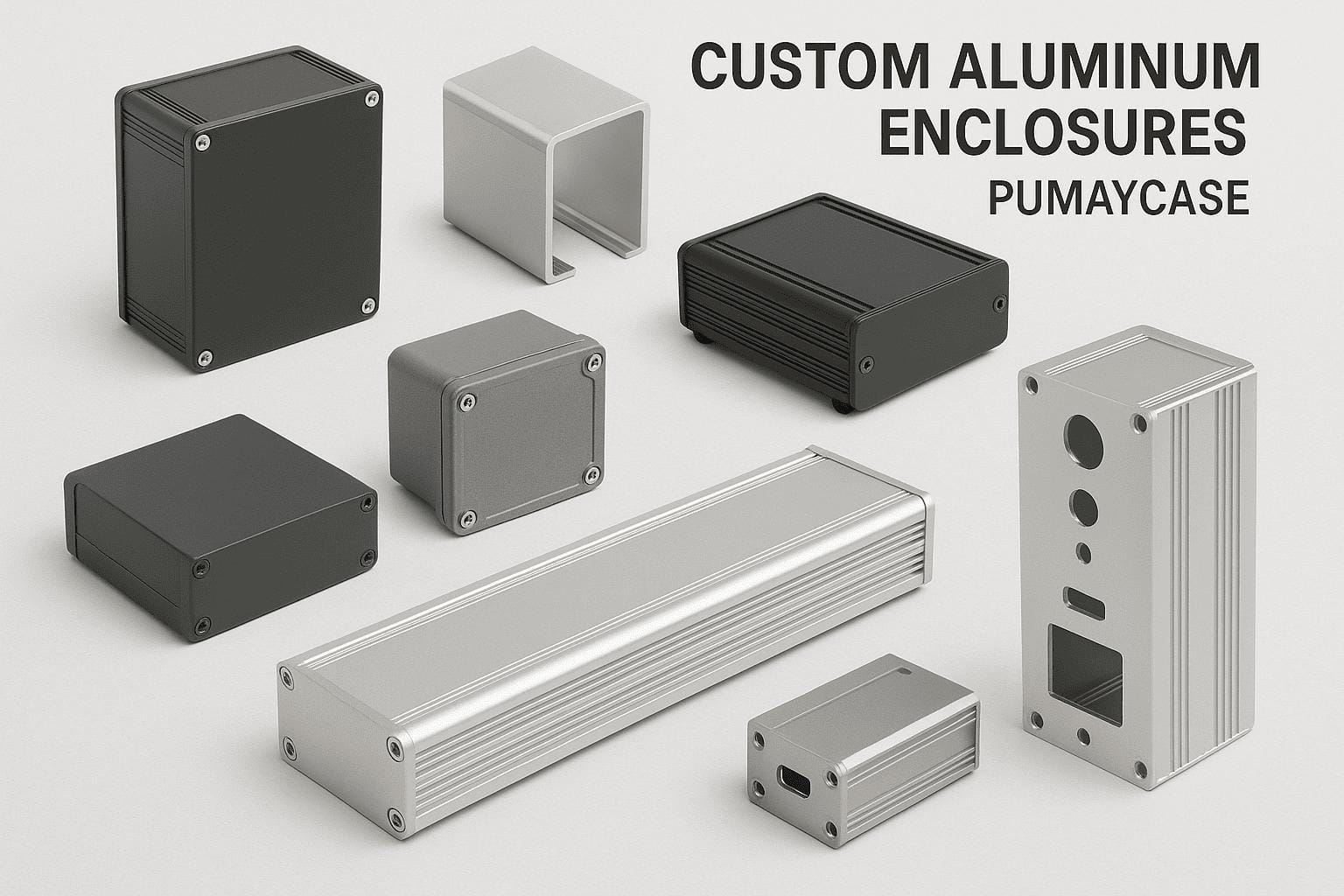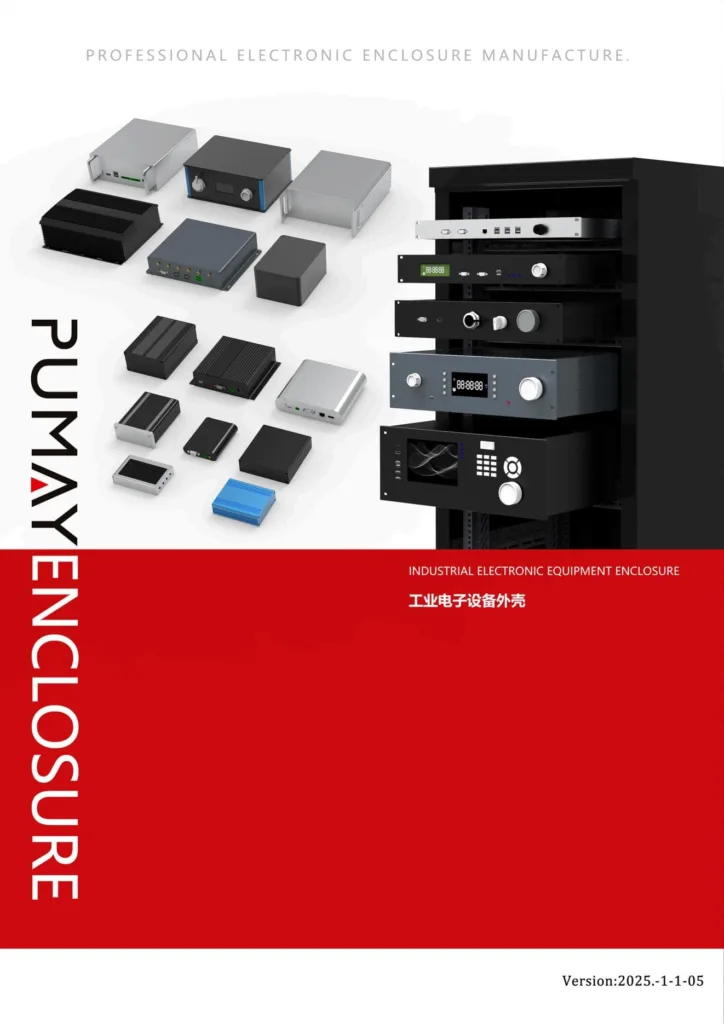Concerned that your aluminum enclosure designs might become outdated? Failing to anticipate market trends risks losing competitive advantage and slowing innovation.
Future trends for aluminum enclosures include increased customization through modular designs, advanced thermal management1, integration with IoT and smart technologies, sustainability improvements2 through eco-friendly materials3, and enhanced durability for demanding industrial applications.
 "Future Trends for Aluminum Enclosure Products"
"Future Trends for Aluminum Enclosure Products"
I've closely observed industry shifts over the past decade, seeing how innovation in aluminum enclosures continuously evolves. Let’s explore key emerging trends shaping the future of aluminum enclosure products.
Why is modular customization4 becoming a major trend in aluminum enclosures?
Struggling with inflexible enclosure designs limiting product development? Traditional fixed designs hinder rapid innovation and customization demands.
Modular aluminum enclosure designs enable rapid customization and scalability, allowing engineers to quickly adapt products to various applications, significantly reducing development time and cost.
 "Modular Design Trend in Aluminum Enclosures"
"Modular Design Trend in Aluminum Enclosures"
From my experience, modularity is one of the strongest emerging trends. Modular systems use standardized aluminum extrusions, interchangeable end plates, and configurable internal layouts. This significantly simplifies rapid prototyping, reduces production times, and accommodates diverse application requirements without costly redesigns.
Benefits of modular aluminum enclosures:
| Benefit | Impact |
|---|---|
| Rapid Customization | Shorter lead-times |
| Cost Savings | Reduced tooling and inventory |
| Flexibility | Easy scaling across applications |
| Faster Innovation Cycles | Accelerates product development |
Modularity ensures your enclosures remain adaptable, keeping you ahead in a rapidly evolving market.
How will advanced thermal management shape future aluminum enclosures?
Facing constant thermal challenges in your designs? Poor thermal management limits product performance and lifespan, especially in high-power electronics.
Advanced thermal management solutions5—such as integrated heat sinks6, phase-change materials7, active cooling, and optimized airflow—are becoming critical, enabling aluminum enclosures to handle increasing thermal loads efficiently.
 "Thermal Management Trend Aluminum Enclosures"
"Thermal Management Trend Aluminum Enclosures"
I've noticed a significant rise in thermal management demands as electronics become more powerful. Future aluminum enclosures will increasingly integrate advanced cooling technologies such as:
- Integrated heat sink profiles: Enhanced extrusion designs for improved passive cooling.
- Phase-change materials (PCM): Effective heat absorption and management during thermal spikes.
- Active cooling systems: Integrated micro-fans or liquid cooling for extreme applications.
Comparison of thermal solutions:
| Method | Efficiency | Complexity | Cost Impact |
|---|---|---|---|
| Integrated Heat Sinks | High | Moderate | Moderate |
| Phase-Change Materials | Very High | Moderate | Moderate-High |
| Active Cooling | Highest | High | High |
Advanced thermal management will become essential for aluminum enclosures, improving reliability and enabling more powerful applications.
Why is IoT integration8 transforming aluminum enclosure designs?
Wondering how IoT trends might impact your enclosure products? Ignoring smart integration could leave your products incompatible with emerging technologies.
IoT integration is transforming aluminum enclosures by incorporating smart sensors, connectivity ports, and built-in antennas, enabling real-time monitoring, predictive maintenance, and remote management capabilities across industries.

"IoT Integration Trend in Aluminum Enclosures"
In my recent projects, integrating IoT into aluminum enclosures has significantly increased. Smart enclosures feature built-in connectivity, enabling remote monitoring, diagnostics, and predictive maintenance. Enclosures increasingly require:
- Integrated antenna solutions.
- Connectivity ports (Ethernet, USB, wireless modules).
- Sensor-friendly design (temperature, vibration, humidity sensors).
Benefits of IoT integration:
| Benefit | Description |
|---|---|
| Real-time Monitoring | Immediate awareness of enclosure conditions |
| Predictive Maintenance | Prevents unexpected failures |
| Remote Diagnostics | Quick troubleshooting, reduced downtime |
Integrating IoT capability will soon become standard, keeping aluminum enclosures future-ready.
How will sustainability drive future aluminum enclosure trends?
Concerned about environmental compliance or customer preferences shifting toward sustainability? Sustainability is rapidly becoming critical for product design.
Sustainability in aluminum enclosure manufacturing focuses on eco-friendly materials3, recyclable aluminum9, low-impact processes10 (e.g., anodizing alternatives), and efficient production techniques, significantly reducing environmental impact and meeting consumer expectations.
 "Sustainability Trend in Aluminum Enclosures"
"Sustainability Trend in Aluminum Enclosures"
From my perspective, sustainability is increasingly shaping customer preferences and regulations. Future enclosure trends will prioritize:
- Eco-friendly aluminum alloys: Recyclable and lightweight materials.
- Low-impact coatings: Environmentally friendly anodizing, powder coatings without hazardous substances.
- Energy-efficient production: Reduced emissions, optimized manufacturing processes.
Comparison of sustainable practices:
| Sustainable Practice | Environmental Impact | Cost Impact |
|---|---|---|
| Recycled Aluminum Alloys | Very Positive | Low-Moderate |
| Eco-friendly Coatings | Positive | Moderate |
| Energy-efficient Processes | Very Positive | Moderate-High |
Embracing sustainability ensures long-term viability and aligns products with market expectations.
Conclusion
Future aluminum enclosure trends highlight modular customization4, advanced thermal management1, IoT integration, and sustainability. Embracing these trends ensures competitive advantage, improved reliability, and lasting market relevance.
Learn about innovative thermal solutions that boost performance and reliability in aluminum enclosures. ↩ ↩
Find out how eco-friendly practices can enhance your product appeal and meet market demands. ↩
Explore sustainable material options that can reduce environmental impact. ↩ ↩
Explore how modular designs can enhance flexibility and reduce costs in aluminum enclosure production. ↩ ↩
Explore effective thermal management strategies to enhance the lifespan of your products. ↩
Learn about the role of heat sinks in improving cooling efficiency for high-power applications. ↩
Discover how PCM can optimize thermal performance in demanding environments. ↩
Discover how IoT features can transform your enclosure products for better monitoring and maintenance. ↩
Learn about the benefits of using recyclable materials in your enclosure designs. ↩
Discover manufacturing techniques that minimize environmental harm while maintaining quality. ↩





